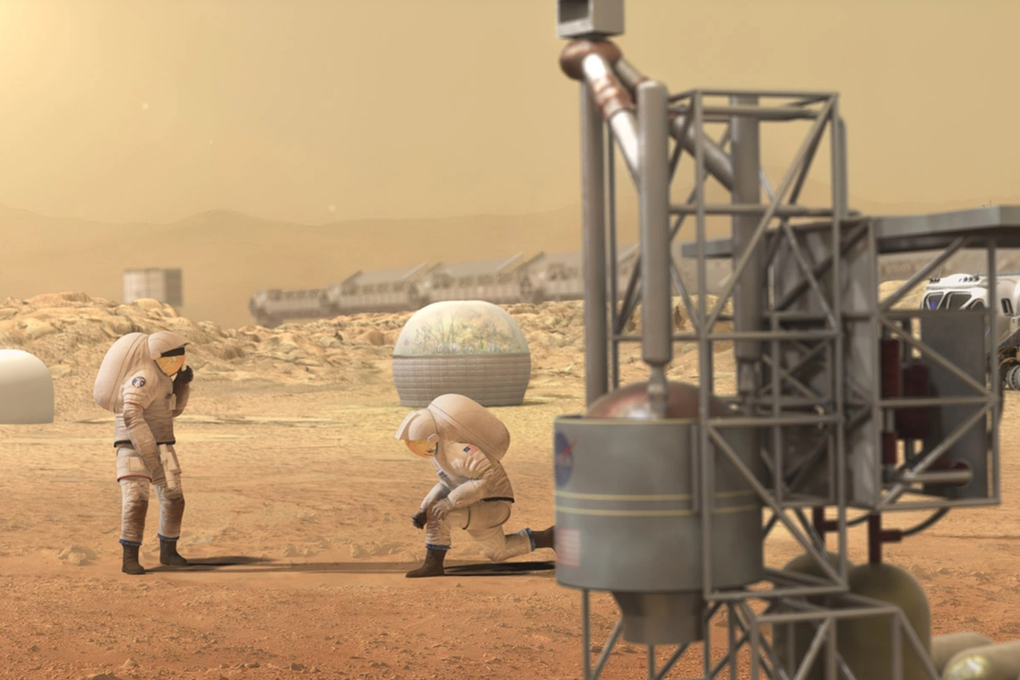
Visualization of what Mars might look like over time, if humans could terraform the planet (Photo: Space).
The concept of terraforming Mars, or altering the planet’s climate to support life, has long been the stuff of science fiction. But a new study suggests that the bold idea may not be so far-fetched.
Mars Colonization: From Fiction to Possible?
An interdisciplinary research team led by Dr. Erika DeBenedictis, CEO of Pioneer Labs, and scientists from the University of Chicago, Harvard, and Los Alamos National Laboratory (USA), has just published a detailed draft strategy. This draft outlines a roadmap for climate change on Mars, aiming to make the red planet a place that can support life in the next few centuries.
"Thirty years ago, colonizing Mars was impossible," Dr. DeBenedictis emphasized. "But now, thanks to technology like SpaceX's Starship and synthetic biology, it is becoming possible."
The renovation plan is divided into three main phases:
-Increasing planetary temperature
The first phase focuses on raising the temperature of Mars by at least 30℃. Proposed engineering solutions include deploying orbital mirrors to reflect sunlight, or placing aerogels on the surface to trap heat. This temperature level is needed to release CO₂ from the subsurface ice, creating the basis for a thicker atmosphere.
- Biological starter
Once temperatures are raised, scientists will conduct experiments with extremophiles – organisms genetically engineered to survive in harsh environments. The goal is to help them initiate photosynthesis, thereby enriching the Martian atmosphere with oxygen.
- Building ecosystem
As the atmosphere becomes thicker and temperatures become more stable, the final stage will introduce advanced plants. This process will gradually build a semi-natural ecosystem, moving towards the ability to support life without specialized equipment.

Colonizing Mars is not only a technological problem but also involves ethical aspects (Illustration: Getty).
Ethical questions and scientific values
Although the Mars colonization project has great potential, scientists say it is not only a technological problem but also involves profound ethical aspects.
Dr Nina Lanza, a planetary scientist at Los Alamos National Laboratory, warns: "If there are traces of ancient life on Mars, the process of reclamation could wipe out that evidence."
This is a major contradiction between the goal of exploring the planet's past and the ambition of creating a future for humans. Besides, many scientists are concerned that interfering with a primitive planet could cause irreversible consequences.
However, the team asserts that initial tests could be conducted on a limited scale, such as a closed test site. This approach would both avoid risks and yield valuable data for planetary engineering.
"Life is the most precious asset of the universe," said co-author Robin Wordsworth from Harvard. "If we can spread it responsibly, we should start from Mars."
Benefits for the Earth

Mars is an ideal place to test green technology, before it is applied on Earth (Photo: Getty).
One of the unexpected benefits of this project is that many of the technologies developed to colonize Mars could come back to aid Earth.
With no fossil fuels or infrastructure available on Mars, designing clean energy systems, CO₂ capture, or biodegradation will require relying on sustainable solutions from the start.
"Mars is the perfect place to test green technology without having to compete with Earth-like options," says Erika DeBenedictis.
Accordingly, creating a "planetary laboratory" on Mars could help humanity improve its understanding of climate change, biosphere regeneration, and how to stabilize ecosystems in harsh environments.
While it will take hundreds of years to fully colonize Mars, the researchers stress that it is most important to start today. Parallel investments in theory, simulations, microscale experiments, and, crucially, international cooperation are needed.
"The journey to make Mars the second blue planet does not begin with a spacecraft, but begins in the laboratory and with theoretical tests today," Erika DeBenedictis affirmed.
Source: https://dantri.com.vn/khoa-hoc/giac-mo-cai-tao-bien-sao-hoa-thanh-noi-sinh-song-co-kha-thi-20250603070409028.htm






















![[Photo] National Assembly Chairman Tran Thanh Man visits Vietnamese Heroic Mother Ta Thi Tran](https://vphoto.vietnam.vn/thumb/1200x675/vietnam/resource/IMAGE/2025/7/20/765c0bd057dd44ad83ab89fe0255b783)














































































Comment (0)